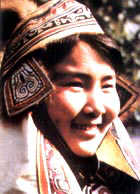 With a population of 4,245 (as of 1990), the Hezhe is one of the smallest ethnic minorities in China. These nomadic people mainly live in the Tongjiang, Fuyuan and Raohe counties by the rivers of Songhua, Heilongjiang and Wusuli in China's northeastern Heilongjiang Province.
With a population of 4,245 (as of 1990), the Hezhe is one of the smallest ethnic minorities in China. These nomadic people mainly live in the Tongjiang, Fuyuan and Raohe counties by the rivers of Songhua, Heilongjiang and Wusuli in China's northeastern Heilongjiang Province.
The Hezhes have their own language which belongs to the Manchu-Tongusi Austronesian of the Altaic Phylum. Their language has two dialects: Qileng and Hezhen. As the result of frequent contact with the Hans, Chinese is widely used among the Hezhes. Only those who are above 60 years old may still speak the Hezhe language. They do not have a script of their own and use Chinese characters for written communication.
The Hezhe's ancestry can be traced to the Nvzhen, a tribe of Tartar horsemen who ravaged the northern borders of several Chinese dynasties. They used to wear clothing made of fish skins and employed dogs for hunting which earned them the titles Yupi Tribe (Fish Skin Tribe) and Shiquan Tribe (Dog-using Tribe). The Hezhes of different regions used to call themselves by various names, mainly Heijin, Heiqi, Hezhen, and Qileng.
During the Japanese occupation, the Hezhe ethnic minority was almost wiped out. The policy of genocide practiced by the Japanese caused a sharp decrease in the Hezhe population, putting them on the edge of extinction, with a population of only 300 prior to 1949. They were formally named the Hezhe ethnic minority after the founding of the People's Republic of China.
The Hezhe people is the only one living on fishing and driving a sledge by dogs in northern China. The fishing industry is the main source of livelihood for most Hezhes. Old and young, male and female, they are all good at fishing. They have gained superb skills and knowledge in fishing through time-tested experience. Hunting is another source of income for the Hezhes. Nowadays, they are also engaged in agriculture and aquatic-breeding.
The Hezhe people used to practice Shamanism. They believe that everything in the universe has a soul. Now, few of them believe in Shamanism.
On the traditional New Year, a family will grind wheat flour, fishing, paste paper designed flowers on windows and make paper Chinese lantern. It's a tradition that every family will make Jiaozi and have a fish banquet on the day.
